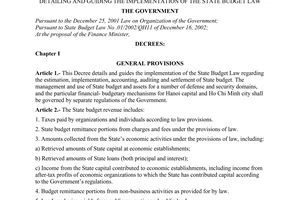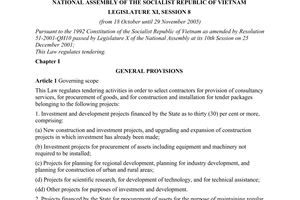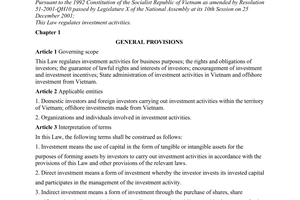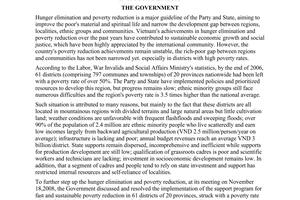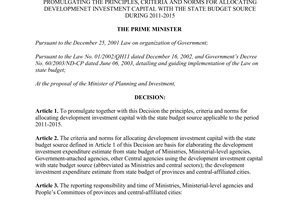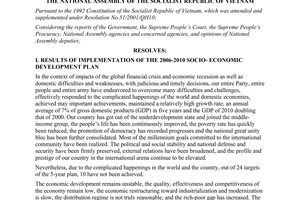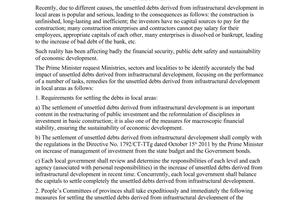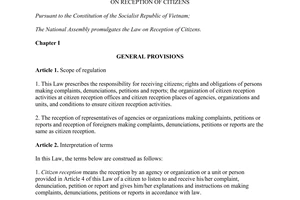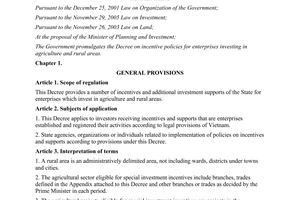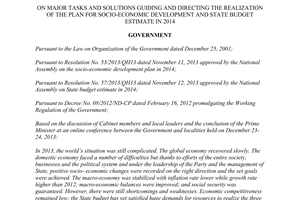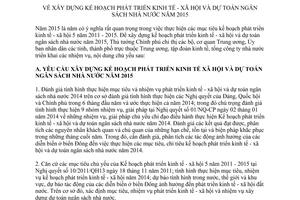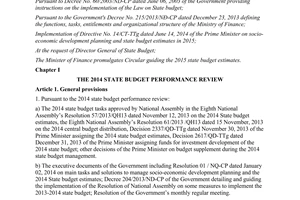Nội dung toàn văn Directive 14/CT-TTg dated 2014 plan for socio-economic development government budget estimates 2015
|
PRIME
MINISTER |
SOCIALIST
REPUBLIC OF VIETNAM |
|
No. 14/CT-TTg |
Hanoi, June 14, 2014 |
DIRECTIVE
ON FORMULATION OF PLAN FOR SOCIO-ECONOMIC DEVELOPMENT AND GOVERNMENT BUDGET ESTIMATES IN 2015
2015 is an extremely important year for the attainment of targets of the five-year Plan for socio-economic development during period of 2011 – 2015. In order to formulate Plan for socio-economic development (hereinafter referred to as Plan) and government budget estimates (hereinafter referred to as Estimates) in 2015, the Prime Minister directs Ministries, central authorities, People’s Committees of provinces, economic groups, state-owned general companies to undertake the following tasks:
A. REQUIREMENTS FOR FORMULATION OF THE PLAN AND THE ESTIMATES IN 2015
1. Evaluate the implementation of objectives and socio-economic development objectives and the Estimates in 2014 according to implementation of Resolutions of the Communist Party, the National Assembly and the Government within the first six months and estimates of implementation in the whole 2014; and attach great importance to evaluate implementation of 9 groups of tasks, and measures prescribed in Resolution No. 01/NQ-CP dated January 2, 2014 on major tasks, and measures directing implementation of the Plan and the Estimates in 2014; then evaluate achievements, analyze objective and subjective reasons for limitations, or shortcomings, and remedial measures for the last months in 2014; evaluate and analyze effects of East Sea development on implementing targets of socio-economic development and the Estimates in 2014.
2. Predict national, worldwide, and regional developments, predict effects of East Sea developments on socio-economic development of Vietnam according to major targets of the 5-year Plan during period of 2011 – 2015 prescribed in Resolution No. 10/2011/QH13 dated November 18, 2011; and implementation of objectives the Plan in 2014. Then, determine objectives and socio-economic development objectives and formulation objectives of the Estimates.
3. Ministries, central and local authorities formulating the Estimates in 2015 must: follow objectives and socio-economic development objectives in 2015 and the 5-year Plan during period of 2011 - 2015; comply with investment plan of the government budget during the period 2014 – 2015; correspond to tasks and major operations of agencies; comply with regimes, and policies of the State on the basis of thrift practices, anti-dissipation; and ensure time as prescribed in the Law on the Government budget and guiding documents.
4. Ensure that there are synchronism, systematic, and close combinations among various agencies in formulation of the Plan and the Estimates in 2015.
5. Ensure the publicity, transparency and justice in the formulation of plan and allocation of sources.
B. MAJOR OBJECTIVES FORMULATION OF THE PLAN AND THE ESTIMATES IN 2015
I. GENERAL OBJECTIVES
Keep macroeconomics stable, and control inflation; intensify the implementation of effective strategy, restructure the economy together with innovation of model of development and improve effectiveness and ensure steady development and reasonable growth in the economy; achieve objectives for social security, social welfare and improve the people’s lives; expand and enhance the effect on settling foreign affairs and international integration; enhance national defense and security, protect national sovereignty, political security and social security and order; enhance administrative reform and anti-corruption, anti-dissipation.
II. SOCIO-ECONOMIC DEVELOPMENT OBJECTIVES
Effectively implement tasks and measures prescribed in Resolutions of Communist Party, National Assembly, and the Government, especially the following tasks:
1. Economic development
Keep carrying out the Project on general economic restructuring together with conversion of development models, and projects on branches or fields restructuring oriented towards improving quality, effect and comparative competence, expanding and diversifying economic, commercial, and investing relations with other countries, enhancing independence of the economy to avoid heavy dependence upon a particular market; check and improve the planning for socio-economic development in the economic regions, administrative divisions, economic fields; strive to achieve Gross Domestic Product (GDP) growth rate at 6 – 6.2%.
Perform agricultural restructuring together with building a new country, encourage applying technology and science to production; proactively produce plant varieties, and domestic animals, especially F1 hybrid rice varieties; enhance provision of production model oriented toward close cooperation among households, enterprises, and market in order to bring agriculture into mass-production with high added value; encourage enterprises to invest in agriculture and rural areas according to Decree No. 210/2013/ND-CP dated December 19, 2013 on incentive policies applied to enterprises invested in agriculture and rural areas; develop marine economy together with duties on protecting national sovereignty over sea and islands; implement policies on providing capital and services at sea and protective measures for fisheries, enable fishermen to catch fishes and contribute to protection of the sovereignty over motherland’s sea and islands.
Perform industrial restructuring, concentrate on development of industrial products with competitive advantage, ancillary industries, hi-tech industries, and industries serving development of agriculture and economy of rural areas; intensify mineral refining industries; restrict and come not to exporting unrefined minerals; develop production area in order to proactively provide raw materials for industries, and gradually replace importing raw materials with them; develop ancillary industries, and increase rate of localizing processed or assembled products; check and improve effectiveness of economic zones, industrial zones and complexes, ensuring safety, security for the business operations of enterprises therein; intensify applications of advanced and modern technology to production. Keep resolving difficulties to boost business, impose measures and promptly deal with procedures for helping enterprises in overcoming damage due to problems and violations against law in administrative divisions over the past period.
Concentrate on development in some of advantageous and value-added services such as tourism, communication, information technology, finance, banking, insurance, and other business supporting services; develop domestic market, offer and implement effectively programs for export of multiple essential services; improve marketing, and public relations to raise status and prestige of domestically manufactured goods in order to replace imported goods with them and decrease our dependence on countries overseas; proactively formulate development program for domestic manufactured goods, give priority to important input-materials used in production.
Synchronically take measures for market expansion and conversion, and new market development; boost export business, closely inspect products that are not encouraged to be imported; diversify importing and exporting market in order to not depend on a particular market; enhance market management, tackle smuggling, commercial fraud, counterfeits, speculation, and market disruption; take consumer protection measures, strictly handle violations. Keep implement plans for adjustments to prices of essential goods, or services according to market mechanism; strongly develop e-commerce operations.
Boost in the progress of public investment restructuring towards eliminating non-urgent projects, and effectively using capital sources to develop the economy in all fields, and impose appropriate measures for attracting non-governmental sources for developing investment; promptly issue guiding documents and implement the Law on public investment, and the Law on Bidding. Impose measures for selection of contractors who are qualified and prestige to overcome financial weakness, lack of construction competence, technological weakness and prolonged construction period; improve legal framework and procedures for promoting investment in the form of Public-Private Partnership (PPP), encourage and enable economic sectors including foreign investors to invest in construction and infrastructural business. ; intensify inspection and unified management of investment projects to ensure that projects are conformable with the plans approved by competent authorities; take active measures for ensuring that infrastructural works shall be on schedule, especially major projects or works having significance for economic development of whole nation, every sector and joint-sector;
Participate in free trade areas with eco-commercial partners; make plans to fulfill commitments, use integration chances and overcome difficulties and challenges; protect assets and absolute safety of investors, prove attraction for foreign investment; proactively promote our member role of the Association of Southeast Asian Nations to use steady development chances.
Improve business and investment climate, concentrate on measures for decreasing market entry costs, access lands and steadily use lands, intensify transparency, and enhance fairly competitive environment.
Intensify commercial bank restructuring and tackle bad debts; open credit market and banking services in accordance with international commitment; carry out monetary policies flexibly and effectively; conduct preferential credit policies applied to fishermen for investment in fishing vessels and related services; and closely comply with financial policies; control appropriate interest rates, and flexible exchange rates; boost steady growth, stabilize value of the Vietnamese dong, and increase foreign-exchange reserves; concentrate on tackling bad debts, ensure a safe credit system and boost credit extension; provide an advantageous business environment and financial instruments to attract financial sources of the people to business; enhance market and pricing management, and consumer protection. Strive to control inflation rate at 7%.
Take appropriate measures for steady development in securities market, improve the effectiveness of capital raising for the enterprises.
Concentrate on improve business environment, improve administrative reform; enhance application of information technology by regulatory agencies; emphasize responsibility of state administrative agencies, ensure the publicity and transparency in administrative procedures and business information.
Keep intensifying state-owned enterprise restructuring; state-owned enterprises shall only concentrate on major fields, important administrative divisions, national defense and security; speed up equitization of state-owned enterprises, sell portion of state capital which is not required to hold, including profitable enterprises operating under market mechanism. separate production, trading and public services; improve mechanism for exercising the right of state ownership and representatives of state ownership at enterprises; enhance management and inspection conducted by the owners; formulate and improve laws, mechanism, and policies on management and investment of state capital in business; strengthen the managerial staff and improve administrative competence of state-owned enterprises; publicize business results of state-owned enterprises.
2. Social development
Keep implementing Resolution of the 11th Party Central Committee (5th plenum) on social policies during period of 2012 – 2020; check, adjust and synchronically implement policies on the people with meritorious services to the resolution, vocational training, provision of employment, social protection, sustainable poverty reduction and social security, especially remote areas, ethnic minorities, safety zones, poor districts and severely disadvantaged communes or villages; carry out mechanism and policies on supporting production and lives of ethnic minorities; improve the quality of vocational training together with provision of employment, proactively train and provide skilled workers for economic zones, industrial zones and major investment projects having signification to national development; expand labor export market. Enhance inspection of implementation of policies on labors, labor safety and payment for social insurance, unemployment insurance offered to laborers.
Intensify and improve the quality of defensive medicine network, proactively prevent epidemic diseases; carry out mechanism, policies, and plans for nationwide health insurance, reduce hospital overload. Introduce appropriate mechanism to manage effectively prices of curative medicines; enhance inspection of food quality, safety and hygiene.
Implement Resolution No. 05/NQ-CP dated January 13, 2014 of the Government on enhancement of implementation of health-related Millennium Development Goals of United Nations. Strive to overcome difficulties and maintain achievements and shoot at targets in Millennium Development Goals by 2015.
Implement effectively Education Development Strategy and Action Program of the Government on implementation of Resolution of 11th Party Central Committee (8th plenum) on radical changes in education and training; enhance private sector involvement in education; improve quality of career education, higher education, especially private schools, and quality of human sources training; concentrate on development of the teaching staff, school administrative officers; consider adjusting the planning for the network of pedagogy schools; keep taking measures for increasing rate and quality of laborers undergone training.
Keep implementing Resolution of 11th Party Central Committee (6th plenum) and Strategy for scientific and technological development; concentrate on carrying out efficiently national program for technological innovation, high-tech development, and national products; intensify implementation of Program for supporting scientific and technological enterprises or organizations in exercising autonomy mechanism; expand placing order or flat rate pay mechanism applicable to scientific research tasks and Fund for scientific and technological development; diversify, and enhance social capital raising to science and technology; develop scientific and technological market, technological assessment and consultancy services; enhance management of metrology, quality and intellectual property; support local governments and enterprises in establishment, protection and exploitation of intellectual property rights.
Implement Resolution of Party Central Committee (9th plenum) on culture; enhance building an advanced culture deeply imbued with national identity and quintessence acquired of humankind culture; reinforce and build a healthy cultural environment; conduct private sector involvement in culture, physical training, sport activities; enhance management of festivals, culture and sport activities; minimize using the government budget for festival organization; proactively fight against debauchery, especially drugs and prostitution.
Implement ethnic and religious policies; attach special importance to take care and protect children, families, and gender equality; efficiently implement Strategy on Vietnamese family development.
3. Management of natural resources, environment protection and response to climate change.
Implement Resolution of 11th Party Central Committee (7th plenum) on proactively response to climate changes, enhancement of natural resource management and environment protection, Resolution of the Government on urgent issues concerning environment protection, the Sustainable development strategy, National Action Plan for Green Public Procurement.
Closely control sources of pollution, especially in handicraft villages, industrial complexes or zones, drainage basin, production facilities which may cause polluted; thoroughly handle facilities causing seriously environment pollution; intensify inspection and handling violations against law on natural resource management and environment protection.
Intensify private sector involvement in environment protection; speed up development and use of new, clean, and renewable energies; increase regulating capacity of resources of water, use water economically, increase water storage capacity for dry seasons.
Provide effective forest protection and development. Increase capacity for disaster prevention and recovery, search and rescue.
Proactively take measures for response to climate changes and sea level rise; combine measures for response to climate changes together in the formulation of planning for development.
4. Administrative reform; tackling corruption, thrift practice, and anti-dissipation.
Finish guidance and implementation of new Constitution; improve quality of legislative document issuance, ensure suitability, feasibility and efficiency during their implementation.
Keep carrying out synchronically and effectively General program of administrative reform; concentrate on simplifying administrative procedures, citizenship-related documents and database relating to population management; expand single-window system. Intensify reforms in official assignment, officials regime, determine job positions and official ranks, positions of civil servants; keep making redundancies; increase application of information technology to State management; strictly handle officials due to their misconduct, harassment, or violations against laws when they carry out their public assignment.
Efficiently implement Law, Action Program and Conclusion of Chairman of Central Steering Committee for anti-corruption; strengthen and improve quality of operations of authorities in charge of anti-corruption; enhance inspection, audits, investigation to prevent, discover, and handle corruption.
Improve efficiency in handling of complaints, or denunciation; implement Law on citizen reception; emphasize responsibility of seniors of local communist authorities, local governments in citizen reception and handling complaints and denunciation; handling the affairs right after problems occurring before they become complicated; handling prolonged and complicated affairs.
5. National defense and security; foreign affairs and international integration
Keep enhancing national defense and security potential, enhancing combat readiness; carry out active plans for specific warfare against every circumstances; enhance people’s national defense and security, especially in major administrative divisions; fulfill duties of national defense and security together with economic development; access modern technologies, keep control of modern technical equipment and weapons.
Enhance maritime law enforcement forces, manfully struggle for protection of sovereignty and benefits of nation in the East Sea with general power and synchronized measures; try best to resolve complicated circumstances by peace measures on the basis of international law, especially United National Convention on the Law of the Sea and Declaration on Conduct of the Parties in the East Sea; take advantage of supporting of international community; develop patriotic spirit and power of entire nation in the protection of national sovereignty; proactively take synchronized measures for prevention and strictly handling incitation or violations against law that causes bad effects on image of Vietnamese nation; proactively aware and predict any circumstances; manfully monitor bad entities, or instigators of incitation, promptly handle to ensure security, order, safety of lives, assets, and condition of normal business of every individuals, or organizations, especially foreign direct investment enterprises.
Efficiently implement national target programs for tackling criminals, drugs, and human trafficking; manfully eliminate criminal gangs; positively implement National Strategy for ensuring road traffic safety and synchronized measures for traffic safety; strictly handle violations; renovate measures to raise the awareness of road users, especially rural areas.
Keep implementing policies on foreign affairs and international integration issued by the Communist Party and State; ensure independence, autonomy, positivity in international integration; strengthen relationships established. Enhance roles and responsibility of Vietnam in the Association of Southeast Asian Nations, United Nations and local and international forums; proactively negotiate and conclude Vietnam - EU Free Trade Agreement, Trans-Pacific Strategic Economic Partnership Agreement.
Protect overseas Vietnamese, protect citizens, freshmen at seas; proactively speak about democracy, human rights and religion.
6. Propagation
Regulatory agencies must promptly provide information for mass media organizations, especially information about policies and laws of the Government; socio-economic situation, investment environment and relevant information about domestic and international development, protection of sea and island sovereignty,…in order for the people to grasp thoroughly policies of the Communist Party and Government; and agreement and supporting of the people during the implementation of that policies.
III. FORMULATION OF THE ESTIMATES
1. Government budget revenue estimates (hereinafter referred to as revenue estimates)
Collection of revenue estimates in 2015 must be formulated on the basis of evaluating possibility of collecting revenue in 2014, estimates of investment, development in production, business, commercial operations, and export - import in 2015 with account taken of internal and external factors in new situation; specific calculation of increase or decrease in revenue due to implementation of new amended regulations of the laws on taxation and implement tariff reduction plan following international commitment; revenues that shall be eligible for tax deferment, exemption, or reduction, according to Resolutions of National Assembly, or the Government; concurrently, enhance inspection of tax declaration of organizations or individuals to discover and promptly handle cases in which taxes are declared incorrectly or paid insufficiently; direct to prevent loss of revenues, collect outstanding taxes of previous years, revenues from investment project exceeding time limit of incentives, or revenues detected during an inspection or audits,..
Then, set target for collection of government budget revenue in 2015 from taxes, fees about 18 – 19% of GDP. The expected average increase in domestic revenue estimates (not including revenues from crude oil, or land levy) is from 14 to 16% in comparison with estimates in 2014 (excluding increase or decrease revenue factors due to policy change). The expected average increase in revenue estimates from export – import operations is from 6 to 8% in comparison with estimates in 2014. The specific increase in revenue shall be determined depending on condition, characteristics and in accordance with growth rate of every administrative division.
2. Government budget spending estimates (hereinafter referred to as spending estimates)
With limited resource condition, Vietnam – China relations shall impact on the economy and government budget in 2015, while demand for development investment, ensuring social security, national defense, security, social order is really major…As a result, the government budget balance in 2015 shall face difficulties. Therefore, Ministries, central and local authorities must grasp thoroughly thrift practices, anti-dissipation right after determination of tasks in 2015, make spending estimates in accordance with regulations of law on regime, standards, quotas on current government spending, in which expenditures must be classified according to their imperative level and implementing possibility in 2015 in order to fulfill political objectives, programs and projects approved by competent authorities based on sources allocated.
Request Ministries, central authorities in charge generally check social security policies to abrogate within their competence or request competent authorities to abrogate overlapped or duplicate policies to save the sources for imperative social security policies in order to promptly make the Estimates in 2015. Only issue new policies if budget sources are balanced.
Give priority to reserve budget sources for Vietnam Marine Strategy by 2020, in which give priority to invest in sea and island development, support fishermen in staying exploiting, farming, and catching aquatic products; ensure requirements for national defense and security for the new situation; classify expenditures into groups to proactively manage and cut them in case of necessity during making the spending estimates in 2015.
In 2015, the spending estimates shall be made as follows:
a) Development investment spending:
The development investment spending of the plan in 2015 must ensure that it helps to achieve objectives of Plan in 2015 and during period of 2011 – 2015; and comply with mid-term investment plan during period of 2014 – 2015 approved by competent authorities.
Ensure that the ratio of the development investment spending to total spending of government budget must be in the appropriate rate; strive to implement the Conclusion of the 11th Party Central Committee 7th plenum (No. 63-KL/TW dated May 27, 2013).
Concentrate on allocating capital to unfinished funding; concurrently, enhance mobilization and combination of other sources in order to complete the funding on schedule approved with regard to targeted supplementary funding from central budget. Grant extension of non-urgent funding. Only allocate capital according to the plan in 2015 to new funding permitted by the Prime Minister to supplement in the mid-term investment plan during period of 2014 – 2015.
With regard to request for investment capital demand and allocation funded by government budget according to the plan in 2015, Ministries, central and local authorities must follow the following rules:
- Implement regulations of Directive No. 1792/CT-TTg dated October 15, 2011 of the Prime Minister on enhancement of managing the investment whose capital funded by government budget and government bonds, Directive No. 27/CT-TTg dated October 10, 2012 on primary measures for resolving outstanding infrastructural development debts in local governments, Directive No. 14/CT-TTg dated June 28, 2013 on primary measures for resolving outstanding infrastructural development debts from capital of government budget and government bonds.
Concentrate on allocating investment funded by government budget to projects of national importance; national defense and security, support for fishermen in catch and services at sea, together with protection of sea and island sovereignty; reduce poverty, provide employment, agriculture and rural areas development, health, education, capital invested in PPP projects,…; major projects having important significance to socio-economic development of fields or local governments.
- Give priority to allocate capital to projects that are completed and being used before December 31, 2014 without adequate capital allocation; repayment of outstanding infrastructural development debts; projects that are expected to be completed by 2015 (according to schedule stated in investment decision, capital balance capacity, and conducting possibility in 2015); reciprocal capital of ODA projects.
- Repay advanced capital in accordance with regulations of Decision of the Prime Minister.
- Allocate the remaining capital for transition projects carrying out on approved schedule. Check scale of investment of transition projects in accordance with their objectives and capital balance capacity.
- Only allocate new commenced capital to new commenced and urgent projects provided that they satisfy all requirements as follows: (1) In the approved planning; (2) Capital sources and capital balance capacity in every budgetary level are determined; (3) Follow investment procedures prescribed in regulations before October 31, 2014; (4) Capital are allocated for repaying outstanding infrastructural development debts as prescribed in building work Directive No. 27/CT-TTg dated October 10, 2012; Directive No. 14/CT-TTg dated June 28, 2013 of the Prime Minister; (5) Projects are not provided for investment spending as prescribed in the Law on Government budget.
- Local governments may not request enterprises to pay an advanced capital in order to carry out projects out of plan, or projects that have been not balanced their capital,..
- Do not allocate targeted supplementary funding from central budget to: new commenced projects without capital assessment, projects whose approved investment decision do not comply with capital assessment granted by the Ministry of Planning and Investment; do not allocate the funding increase in total investment as prescribed in Directive No. 14/CT-TTg dated June 28, 2013 of the Prime Minister. Do not allocate the funding from central budget to projects funded by local budget that their capital has not been assessed or their approved central budget capital is higher than assessed capital.
b) Regular spending:
During formulating regular spending estimates in 2015, Ministries, central and local governments must:
- Formulate spending estimates in development of education and training, science and technology, health, culture and information, environment in accordance with Resolutions of the Communist Party, the National Assembly; prioritize expenditures on social security, support for freshmen at seas; increase expenditures on national defense and security to ensure social security and order in new circumstances, expenditures on administrative management. The regular spending estimates shall be formulated according to current spending policies, and quotas.
In 2015, Local Congresses of the Communist Party shall be held to come to National Congresses of the Communist Party in 2016, ministries regulatory bodies, and local governments shall formulate estimates and balance funding for implementation pursuant to regulations of Politburo, Secretariat and guidance of competent agencies. 2015 is also the year of big anniversaries, Ministries, regulatory bodies, and local governments shall formulate estimates of holding anniversaries with most economical and efficient method.
- Check all programs, or projects that will be associated to decrease coincidence and dissipation. Restructure expenditures in accordance with balanced capacity of government budget.
- The regulatory agencies, especially Ministries within their competence must promptly classify types of public services using government budget; improve eco-technical norm system considered as basis to calculate necessary costs in prices and fees for public services; determine range of fees for public services using government budget, according to appropriate progress which are conformable with contributed capacity of the people in every administrative divisions. Then, Ministries, regulatory bodies, and local governments shall classify public service providers as proper fees in order for regulatory authorities to be transferred method of investment funded by government budget.
- Keep implementing targeted supplementary development funding from central budget to local governments to implement national target programs, or program approved by competent authorities.
- Request Ministries, regulatory bodies, local government, or agencies using budget to make regular spending estimates according to nature of funding, economy, especially spending estimates on purchase of expensive equipment, minimize quantity and scale of organization of festivals, conferences, seminars, closing ceremonies, signing ceremonies, commencement ceremonies, award ceremonies, guest reception, domestic and international business trips and other unnecessary or non-urgent tasks; spending estimates for these tasks shall not increase in comparison with the spending estimates in 2014 in case of difficult balanced budget.
- Keep establishing sources of salary reforms from saving sources of 10% of regular spending (not including salaries and salary-related amount) in 2015; a portion of receipts shall be reserved according to policies of administrative bodies and public service agencies; reserve a certain rate of an increase in the central budget revenues and 50% of increase in the local budget revenues (not including increase in the land levy).
c) Implementation of national target programs:
Ministries in charge of programs shall formulate rules, criteria, quotas of capital allocation of every national target program as the basis for formulation of spending estimate allocation of national target program 2015; take charge, cooperate with relevant Ministries in evaluation of implementation of national target program as the basis for formulation of national target program 2015, request list of national target programs during period of 2016 – 2020. National target program 2016 – 2020 requested by Ministries or agencies must be oriented towards concentration, priority, combination and reduction in programs, objectives, and projects. The Ministry of Planning and Investment shall cooperate with the Ministry of Finance and ministries in charge in formulation of national target programs 2016 – 2020, then submit them to the Government and the 13th National Assembly (9th plenum) for approval.
Allocate government budget capital source to local governments, give priority to disadvantaged areas, areas that are required to deal with urgent problem; give priority to projects whose deadline is 2014 and that projects have not been allocated enough capital or transition projects that are required to hasten progress; new commenced projects that are just allocated capital must ensure procedures as prescribed and to be finished by 2015; minimize provision of funding for conferences, seminars, closing ceremonies, visiting, and training; do not provide funding of Communist Youth Union for regular spending of national target programs.
Local governments proactively combine national target programs with other target programs or projects which have the same contents and be carried out in the administrative divisions with the former; mobilize whole sources to achieve general objectives of programs, ensure that the capital shall be used economically and efficiently.
d) Programs/projects using Official Development Assistance (ODA):
Make the Estimates in 2015 following procedures and regulations of the Law on government budget, the Law on Public debt management and guiding documents, Decrees of Government on infrastructural investment and constructional management and use of ODA, in which specification of ODA sources, reciprocal capital in programs/projects and infrastructural development capital, development funding must comply with disbursement progress of 2015; ensure that allocating enough spending estimates from ODA sources to projects in the progress of disbursement according to signed documents of program/project and aid conventions. Give priority to allocate enough reciprocal capital to ODA programs/projects from both government budget and government bonds (if any).
Total loan or aid sources for coping with climate changes shall be balanced in the annual estimates and be allocated for general spending of government budget, in which there are national target programs for coping with climate changes and investment in projects to cope with climate changes.
dd) Government bond capital:
In 2015, keep allocating government bond capital to supplement a portion of reciprocal capital to ODA programs/projects, national target programs for building a new country; transport, irrigation, health projects which are allocated Government bond capital by the National Assembly during period of 2012 – 2015 and supplemented Government bond capital during period of 2014 – 2016; strictly implement regulations of the National Assembly and the Government on use of Government bond capital sources.
- ODA programs/projects: Only allocate reciprocal capital to socio-economic infrastructure projects managed by the Central and provide reciprocal capital to socio-economic infrastructure projects for poor local governments which are receiving budget balance supplement from central budget according to supporting criteria and quotas prescribed in Decision No. 60/2010/QD-TTg dated September 30, 2010 of the Prime Minister; give priority to allocate Government bond reciprocal capital for programs/projects using ODA capital of 6 developed banks, including: WB, ADB, JICA, KFW, AFD, KEXIMBANK in order to hasten disbursement progress, ensuring commitment in signed conventions and progress of programs/projects.
- National target program for building a new country: Concentrate on allocating Government bond capital to support investment in infrastructure for communes following objectives of the programs approved by competent authorities; in which give priority to severely disadvantaged communes, border communes, or safety zone communes; severely disadvantaged communes in cape coasts or islands; poor communes in poor districts prescribed in Resolution No. 30a/2008/NQ-CP, districts having high poor household rate, highland districts of provinces bounded by the Central Highlands, Cuu Long Delta, and other areas; and major communes.
- Transport, irrigation, and health projects that must be allocated capital to be finished and put into operation before December 31, 2014, projects that are expected to finish by 2015 and other major projects.
- Ministries, regulatory bodies, and local governments shall use government budget sources, other capital sources of State and capital sources from other economic sectors in order to supplement capital to projects using Government bond capital that are in progress but have not been allocated enough capital.
e) The central budget and local budget shall make a budget reserves as prescribed in regulations of the Law on government budget in order to proactively cope with natural disasters, flood, epidemic diseases, national defense and security and implement important or urgent duties arising without estimates.
3. Formulation of local budget estimates
2015 is the last year of the stable period of local budget of 2011 – 2015. Local budget estimates in 2015 shall be formulated on condition that there are enough sources to implement policies issued by competent authorities and regulations of the Law on government budget. Apart from satisfying requirement of Clause 1, Clause 2 of above Section III, budget estimates of local governments in 2015 must follow the requirements below:
a) Formulation of revenue estimates in administrative divisions:
Calculate exactly and sufficiently revenue sources in every field and every tax according to objectives of the Plan during period of 2011 – 2015, possibility to implement socio-economic targets and government budget in 2014, economic growth forecast and revenue sources in 2015 in every sector, field, capacity of taxpayers in administrative divisions, and new and large revenue sources in administrative divisions. Analyze, evaluate effects of revenue estimates in 2015 on each administrative division, revenue field, receipt, tax, in which concentrate on evaluating effects on revenue sources due to implementation of policies of tax extension, exemption, and reduction, land rent exemption (land rents, land levy, amount of state-owned house sale,...) and new revenue policies of competent authorities.
b) Formulation of local budget spending estimates:
The local budget revenues shall be determined according to divisions, rate (%) of revenue division between central budget and local budget or balanced supplement from central budget to local budget (if any) which is allocated in the stable period of 2011 – 2015 and supporting supplement according to balanced capacity of central budget as prescribed in Decision No. 59/2010/QD-TTg dated September 30, 2010 of the Prime Minister on issuing quotas of regular spending allocation estimates of government budget in 2011. Within determined scope of local budget revenue sources, local budget spending estimates shall be formulated in each field in which spending sources of education - training, science – technology, culture – information, environment development must be ensured according to Resolutions of the Communist Party, and the National Assembly.
Formulate the spending estimates for major projects, and the targeted supplementary funding estimates from central budget in 2015 as prescribed in Point b Clause 2 Article 29 of Decree No. 60/2003/ND-CP dated June 6, 2003 of the Government on providing instructions on the implementation of the Law on government budget according to balanced capacity of local budget, implementation of targeted supplementary funding estimates from central budget to local budget in 2014, according to current policies. Determine the targeted supplementary estimates of investment capital according to supporting targets and quotas as prescribed in Decision No. 60/2010/QD-TTg dated September 30, 2010 of the Prime Minister on issuing rules, targets, and quotas of investment funded by government budget during period of 2011 – 2015; determine targeted supplementary estimates of development funding according to approved policies ensuring sources implementing policies in 2015.
c) Land levy revenues:
Local governments that formulate land levy revenue estimates in administrative divisions in 2015 must comply with ability to implement approved land-use planning, plan and progress in land use right auction, land allocation and payment of land levy as prescribed in Law on land in 2013, estimate land levy receipts of projects that are deferred time of receipts from 2014 to 2015 due to their financial difficulties; concurrently, make plans for equivalent spending estimates of infrastructural development to invest in socio-economic infrastructures, projects for emigration, relocation, and preparation for construction premises.
d) Revenues from lottery operations:
Manage receipts and spending from government budget (not include in government budget balance) and use to invest in social welfare projects, in which education, health, agriculture and rural area infrastructure shall be preferentially invested as prescribed.
dd) Formulate plans for mobilize and repay debts (both principal and interest) of development investment as prescribed in the Law on government budget and Decree No. 60/2003/ND-CP dated June 6, 2003 of the Government providing instructions on the implementation of the Law on government budget; ensure that deposit balance (including estimate amount in the year) does not exceed 30% of spending estimates of infrastructural development investment of provincial budget (not more than 100% regarding to Hanoi city and not more than 150% regarding to Ho Chi Minh city).
4. Ministries, regulatory bodies, local governments, and units using government budget shall proactively evaluate achievement, shortcomings in administration of receipts and spending in 2014; analyze reasons to give resolving measures together with making the Estimates in 2015,. Direct and implement declaration and inspection of the budget in 2013 as prescribed in the Law on government budget. Report declaration of finished investment project capital (finished projects without declaration approval up to June 2014 and expected to declaration up to the end of 2014) as prescribed in Directive No. 27/CT-TTg dated December 27, 2013 of the Prime Minister on enhancement of declaration of finished project capital. Publicize declaration of government budget in 2012; carry out inspection and observation on management and use of development investment capital; handling shortcomings and mistakes about spending estimates not accordance with actual implementation and Resolutions of the Communist Party, the National Assembly, the Government, the People’s Council right after period of formulation of estimates if inspectors or audit agencies detect and request in accordance with corresponding regulations of law.
C. IMPLEMENTATION
1. THE MINISTRY OF PLANNING AND INVESTMENT:
a) Take charge, and cooperate with the Ministry of Finance in calculation and determination of plans, large balance in order for Ministries, regulatory bodies, and local governments to formulate the Plan and the Estimates in 2015.
In order to ensure the accurate and uniform information and statistics nationwide, the Prime Minister shall assign the Ministry of Planning and Investment (General Statistics Office) to calculate and announce the achievement of GDP target in the administrative divisions to provinces from 2010 to 2013. These are official figures about implementation of GDP in every province. The provinces shall cooperate with statistics agencies in checking and calculating achievement of GDP goal in administrative divisions within the first six months of 2014 and result estimates in 2014. Then, according to objectives and prospective development, they shall formulate plans for achievement of GDP goal in the administrative divisions in 2015 and the following years.
b) Provide guidance on formulation of the Plan together with report on achievements in the progress of reaching Vietnam Millennium Development Goals, programs, objectives, orientation and measures for human source development; Plan for investment development in government budget and Plan for government bond capital in 2015; estimate capacity of capital raising and balance investment capital; targeted supplementary funding in 2015 of ministries or central agencies.
c) Take charge, cooperate with Ministries, relevant agencies in working with ministries or central agencies, the People’s Committees of provinces on Plan and Plan for development investment in 2015.
d) Take charge, cooperate with the Ministry of Finance in estimate of allocating project on Plan for investment capital of central budget and Plan for Government bond capital in 2015 to Ministries, central and local governments.
dd) Take charge, cooperate with the Ministry of Finance, Ministries, administrative authorities in the National target program on summarizing objectives and tasks and allocating project on central budget expenditure estimates (including capital for investment or capital for administration tasks) to implement the National target program in 2015.
Keep changing administration in implementation of the National target program in 2015 and the following periods.
2. The Ministry of Finance:
a) Instruct Ministries, regulatory bodies, and local governments evaluate implementation of estimated receipts and expenditures of government budget in 2014 and make a government budget estimate in 2015.
b) Take charge, cooperate with Ministries, relevant agencies in working with ministries or central agencies, the People’s Committees of provinces (as prescribed in the Law on government budget) on the Estimates in 2015.
c) Take charge, cooperate with the Ministry of Planning and Investment in Estimates of allocating project on regular spending, national reverse spending of central budget in 2015, estimate the targeted supplementary regular spending in 2015 allocated for local budget from central budget. Cooperate with the Ministry of Planning and Investment in estimate of allocating project on development investment spending of central budget in 2015 (including targeted supplementary funding for investment capital of local budget).
d) Take charge, cooperate with the Ministry of Planning and Investment and relevant agencies in formulating and summarizing the Estimates in 2015; allocating project on central budget in 2015, then request the government to make remark and request the National Assembly to decide.
3. The Ministry of Planning and Investment and the Ministry of Finance closely check information, figures, and capital allocated to Ministries, regulatory bodies, and local governments as prescribed before submitting them to the Prime Minister; and they are responsible for the accuracy of reported information to the Prime Minister.
4. Ministries, administrative authorities of national target programs:
a) Cooperate with the Ministry of Planning and Investment and the Ministry of Finance in requesting for changing administration of national target programs implementing in plan of 2015 and following period.
b) Evaluate implementation of national target program in 2014; make a plan for implementing and the Estimates to implement national target program in 2015.
Take charge, cooperate with relevant units in plan for central budget estimate allocation to implement national target program in 2015 on the basis of total funding estimates given by the Ministry of Planning and Investment, and the Ministry of Finance, then send them to the Ministry of Planning and Investment and the Ministry of Finance for summarizing.
5. Ministries, ministerial agencies, other central authorities, local governments, organizations using government budget funding:
a) Take charge, cooperate with the Ministry of Planning and Investment, the Ministry of Finance in formulation of Plans for socio-economic development in combination with reports of implementation of relevant Millennium development goals; objectives, orientation and measures for human resource development and the Estimates in 2015 of fields in charge.
b) Ministries, regulatory agencies within their competence shall establish objective, quotas, plans for socio-economic development of fields in charge according to their resource balanced capacity. Propose new measures, or policies or propose amendments to current policies then request competent authorities issue the amended policies before making budget estimates (before July 20, 2014), then send the Ministry of Planning and Investment, the Ministry of Finance, relevant Ministries or agencies as the basis of making the Plan and the Estimates in 2015.
c) Agencies in charge of national target programs in Ministries, regulatory bodies, and local governments shall estimate objectives, tasks and propose human resources in charge of national target programs to agencies in charge; concurrently, send the Ministry of Planning and Investment, the Ministry of Finance to record them to plans for implementing national target programs, Plans for socio-economic development and the estimates in 2015.
6. The People’s Committees of provinves:
a) Provide guidance, organize and direct the Services of Planning and Investment, and Services of Finance in cooperation with other services, agencies in making Plans for socio-economic development and the estimates in 2015 of local governments, take responsibility to the Prime Minister for formulation of plans for socio-economic development and the estimates of provinces. Formulate socio-economic development based on business capacity of local governments to determine GDP growth target in accordance with the current circumstances.
b) Collect opinion from organizations, unions, communities about Draft of the Plan and the Estimates in 2015, in combination with reports on implementation of Millennium development goals in provinces in order to achieve agreement, then request competent authorities for decision; concurrently, send reports to the central authorities as prescribed.
D. SCHEDULE ON FORMULATION OF PLAN
1. In June 2014, the Ministry of Planning and Investment and the Ministry of Finance provide Guidance on formulation of Plan; plan for investment in government budget and Government bonds and estimated receipts and expenditures to government budget in 2015.
2. After the Ministry of Planning and Investment and the Ministry of Finance provide Guidance on formulation of Plan and estimated receipts and expenditures to government budget in 2015, Ministries, ministerial agencies, other central authorities, local governments, other agencies or units using government budget send reports to the Ministry of Planning and Investment, the Ministry of Finance and State Audit Agency before July 20, 2014 on the basis of implementation of the first 6 months of 2014, implementation of the Plan and the Estimates in 2015.
3. In August 2014, the Ministry of Planning and Investment and the Ministry of Finance summarize the Plan and the Estimates in 2015; concurrently, estimate a plan for allocating government budget in 2015.
4. Before September 10, 2014, Ministries, ministerial agencies, central authorities, local governments, other agencies or units using investment capital in government budget collect opinion from the Ministry of Planning and Investment, the Ministry of Finance and relevant agencies to complete the Plan and the Estimates in 2015 and send them to the Ministry of Planning and Investment, the Ministry of Finance, and State Audit Agency.
5. In September 2014, the Ministry of Planning and Investment and the Ministry of Finance send the Plan and the Estimates in 2015 to the government. Then the government shall give suggestion, complete, and submit them to the National Assembly as prescribed in regulations of the Law on government budget.
6. Before October 31, 2014, the Ministry of Planning and Investment, the Ministry of Finance shall announce total investment in government budget and Government bonds in 2015, spending estimates of central budget provided for national target program to Ministries, ministerial agencies, central authorities, local governments, other agencies and units using government budget capital.
7. Before September 10, 2014, Ministries, ministerial agencies, central authorities, local governments, other agencies or units estimate project lists and actual capital allocated for each project using central budget capital; and specific plan for capital allocation to each subproject in the national target program according to total capital as announcement, then send them to the Ministry of Planning and Investment and the Ministry of Finance.
8. Pursuant to Resolutions of the National Assembly, the Prime Minister shall:
a) Transfer the Plan and the Estimates in 2015 to Ministries, ministerial agencies, central and local authorities before November 20, 2014.
b) Transfer the Plan for investment in government budget and Government bonds before December 15, 2014.
9. Pursuant to Decision of the Prime Minister on transferring plan, the Ministry of Planning and Investment shall:
a) Transfer to Ministries, ministerial agencies, central and local authorities the Plan in 2015 before November 30, 2014.
b) Transfer the specific plan for investment in central budget and Government bonds to ministries and local governments before December 20, 2014.
10. Before November 30, 2014, the Ministry of Finance shall transfer the specific estimates in 2015 to Ministries, ministerial agencies, central authorities, local governments, other agencies or units.
11. Before December 10, 2014, the local governments shall decide and transfer the Plan, and the Estimates ( for investment capital in specific investment estimates in local budget balance) to subordinates on the basis of responsibilities assigned by the Prime Minister and guidance of the Ministry of Planning and Investment and the Ministry of Finance. Ensure budget estimates of communes shall be decided before December 31, 2014.
12. Before December 31, 2014:
a) Funding recipients shall decide allocate revenue and spending estimates to every affiliated unit on the basis of tasks and estimates that competent authorities allocate and provide guidance.
b) Ministries, ministerial agencies, central and local authorities shall announce list and capital level invested in central budget and Government bonds according to plan of 2015 to units in charge of implementation.
The Prime Minister requests Ministers, Heads of ministerial-level agencies, Heads of Governmental agencies and other central authorities, the Presidents of the People’s Committees of provinces, the Chairperson of the Executive Board, General Director of corporations, state-owned corporations, Heads of organizations, units using government budget to be responsible for implementation of this Directive./.
|
|
PRIME
MINISTER |
------------------------------------------------------------------------------------------------------
This translation is made by LawSoft and
for reference purposes only. Its copyright is owned by LawSoft
and protected under Clause 2, Article 14 of the Law on Intellectual Property.Your comments are always welcomed

